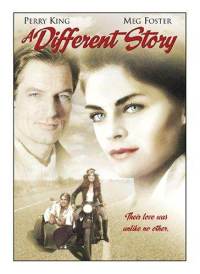
A DIFFERENT STORY
US, 1978, 106 minutes, Colour.
Perry King, Meg Foster, Valerie Curtin, Peter Donat.
Directed by Paul Aaron.
A Different Story is different - yet the same. It is a love story. However, the two characters are homosexual. One giving a place to stay to the other, they gradually fall into a routine, become best friends, fall in love and marry - but especially for the sake of the man, who is an illegal alien in the U.S. They also have a child.
The film was made in the late '70s, in a period of discussion about homosexuality before AIDS. The film raises a number of questions about psychological and personal orientation, friendships and love, the possibility of change in orientation or not, the effect of marriage and family. Perry King and Meg Foster and quite effective in the central roles. The film raises a number of questions - without prurience, without focusing on stereotypes and prejudices.
1. An interesting story: different, the same?
2. California locations? Americana? Validity for elsewhere? Los Angeles settings: homes, lifestyles, the fashion world? The musical score: the song in the middle, at the end?
3. The title and expectations? Audience response to homosexuals and homosexuality? Acceptance, understanding, questions? The credibility of the screenplay?
4. The introduction to Albert: with Sills, his lifestyle, the chauffeur, social life, music, relationships? Changing chauffeurs? Meeting Stella in the house, her decision to let him stay with her, her friendliness, his own life, background, personality, orientation? Neat, cooking? The encounter with Chris? With Phyl? The discovery about Stella's orientation? His illegal immigrant status?
5. The introduction to Stella, her work, the offer for Albert to stay, the meals, her caution, her friends, dressing to go out, Albert's reaction to the fact of her being lesbian?
6. Their starting a household, the routines, reversing expected roles of men and women, Stella working, questions of ringing or not about lateness, Albert preparing the meals, keeping the house in order, fixing the sewing machine, angry at Stella? Stella and her relationship with Chris? Phyllis and her upset and the scene? Albert going elsewhere, to the baths, meeting Roger, forming a friendship? Sills and his phone call asking him back? The comedy and the tension of Stella's preparing the meal with Albert's help for her parents, the parents' visit, their reaction to the meal?
7. Albert as illegal immigrant, the officials coming, Stella's warding them off? His going to the bus to New York? Stella's farewell, change of mind? The wedding, the happiness, the arrangement at home, their seeming a couple? The birthday celebration, the outing, the cake, the attraction? Their making love? The sexual relationship? The effect on each, shyness and awkwardness, coming to terms with it? Their being truly a couple?
8. The pregnancy, the visit to the doctor, their happiness? Preparation for the birth? Phyllis and the encounter at the car park, her anxieties? The phone call, the news of the pregnancy, her suicidal attitudes? Their going over, the neighbour, her threatening them with the gun? The happiness of the birth? The nights and the crying child? Their being loving parents?
9. Albert and his work, design, success, very busy, late home, socials, Stella's jealousy? The build-up to the show and its style? Stella's going after the party, catching him in the shower with the model? Not letting him talk? Her leaving, divorce, at her parents' house, showing the client around and the visit of Albert?
10. Albert pursuing her, desperate, his confrontation in the house, declaration of love and friendship, hope for the future?
11. Phyllis, her anguish as a lesbian, the touch of the stereotype, her jealousy with Stella, against Chris, feeling ousted, the pregnancy, her tantrum with the gun?
12. Sills and his lifestyle, changing chauffeurs? Roger and his TV production, the visits from Ohio, the liaison with Albert?
13. The quality of the screenplay: presenting the characters fairly, stereotypes or not, balanced in their sexual orientation or anguish? The possibility of change or not? Couple, parents? A future? Insights into human nature?